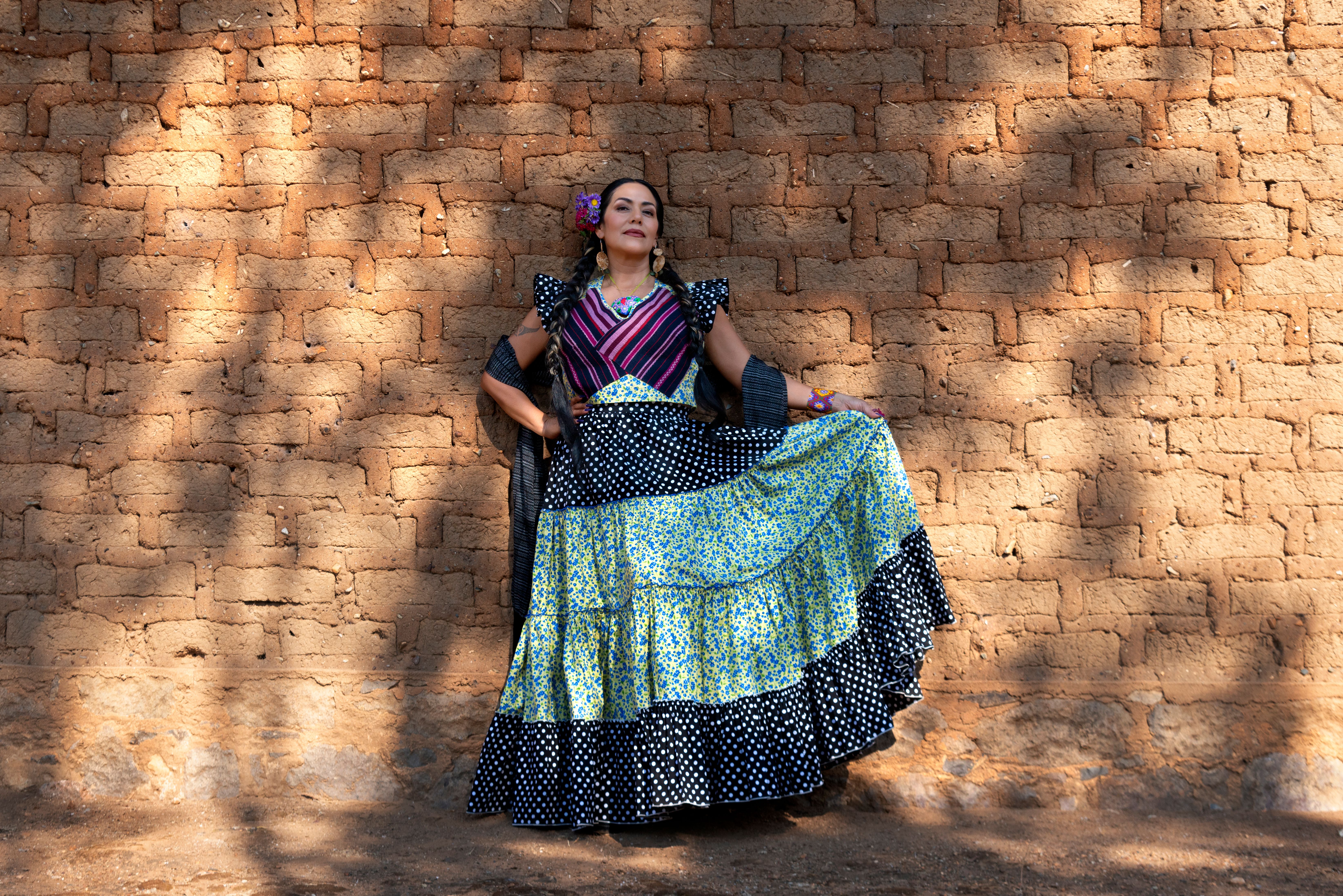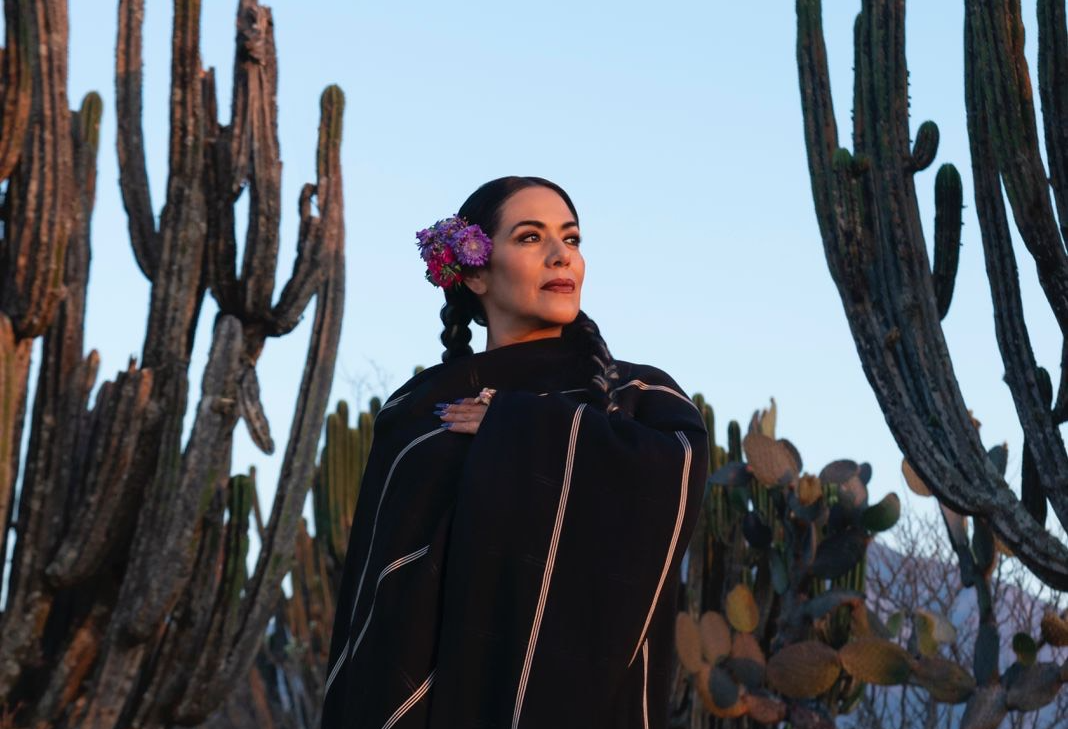Few female Mexican musicians have had such an impact – or inspired such a dedicated following outside Latin America – as Lila Downs who is marking 30 years since the release of her first album, 1994's Ofrenda, and 20 years since her first UK performance with a gig at London's Barbican Centre this month.
Her return is overdue, she agrees when we speak by zoom, with Downs dialling in from her home in Oaxaca, southern Mexico.
A planned London gig last summer was postponed, understandably given that Paul Cohen, her partner and manager – who had also played on stage with her for almost 30 years – died in December 2022 from heart disease.
"It hasn't been easy," says Downs, who talked candidly about Cohen's illness when we last spoke a few years ago and who now explains that their personal partnership had faced many challenges in the months up to his death.
One can't help hearing some of these heartstrings being pulled in a range of directions throughout the music on her latest album, La Sánchez, which she says "gives me a chance to tell a bit more of my own story."
While many will know that Downs – who sings in Spanish, English, Mixtec and Zapotec (and often in several other of the more than 120 indigenous languages spoken in Mexico) is the Oaxacan-born daughter of Anita, herself a singer with indigenous heritage, not everyone will recognise that Sánchez is the maternal surname that Ana Lila Downs Sanchez has carried from birth.
Like La Sanchez senior, Downs was born and raised in Oaxaca but then moved to the United States as a teenager to studying textiles – Downs is well known for her collection of traditional blouses known as huipiles and rebozos (a multi-purpose shawl, which anyone who has seen the film Frida will recall her wearing in the scene where she sings a song during a party at the home of muralist Diego Rivera) - and to spend some time with her father.
As a teenager in the US however, she says she was much more interested in the music of the Grateful Dead than the myriad styles of Mexican folkloric music which can be heard in a number of forms across her 15 albums - she's also collaborated with several other artists including Eddie Palmieri, Colombia's Juanes (on a song about the Ayotzinapa scandal) Mercedes Sosa and Sara Curruchich).
Her father died when she was just 16 but Downs remains close to her mother who 'doesn't hold back on offering advice' and who now helps look after the two children Downs and Cohen adopted.
I ask if they are joining her on this month's trip and she says no, before wondering if she should have brought them along and then pointing out that her visit is, as always, a lightening one with just a couple of days before the concert which she is excited to be spending at the Skoll World Forum at Oxford University's Said Business School.
"This will be my first trip to Oxford and it is exciting to connect and create and that we have this great opportunity where we can partake in a forum and discuss some subjects that have changed – and some that have not." She's referring to a pet theme that she regularly returns to in her music – our connection to the land – and to immigration. Alongside her own work, old and new, she'll be singing a Woody Guthrie standard, "This land is your land "
"I began my career singing this song because I wanted to connect with English speakers and speak to them about immigration and how it was affecting my generation – Latinamerica plays such an important part in the immigration picture in North America" says Downs, recognising that there is a large Latino diaspora across Europe and the UK too.
"My connection to the stories of immigrants, to workers – many relatives from the Mexican side of my family went to work in the US – has always been very strong and things haven't got any better in the years I've been singing about these stories," she reminds me.
"Everyone has a story, the healers, the abuelas – the grandmothers, the tías - all those women who have something to teach us - so I try to incorporate them in my songs."
And while her songs now take on an extra layer of meaning, fans may notice a slight change in the tone as well – as Downs has matured, she's also exploring the lower registers of her voice a lot more on La Sanchez, in the cumbia style Solita Solita and in especially in Ni Maíz – which I can see becoming an audience favourite.
Plans for La Sánchez – including working with some of her regular band members – were already well advanced when Cohen died so she recorded the vocals anyway and then toured closer to home because as she told NPR's Betto Arcos : 'I was worried my voice would have gone if I didn't use it.'
Downs tells me she also wanted to be close to the two children she adopted with Cohen, a son and a daughter "who inspire me". Some of the words to Toda La Noche came from her younger child, Vanessa "when we were snuggling up together one night about a year and a half ago, she was whispering some words and I started humming and then I composed the next verse. It's a real family song and contains the line "you'll always be with me wherever I go. I really love this song, its such a great jazz tune."
Juggling family and music doesn't leave a lot of spare time but Downs is celebrating another milestone this year – the anniversary of her work with the Fundación Rosario Castellanos, a small not for profit based in Oaxaca which raises money to support the education of young indigenous women. Education is so important and we now have a great scheme where girls who have studied and now back as leaders in their communities – one women got a PhD and is now really making a huge difference. I'm so grateful to have lived to see these changes - and that I'll have the chance to play at a fundraising concert at Mexico City's Casa Barragan in May to help the Fundacion continue their work.

Some issues – also close to her heart haven't moved on as much as Downs would have liked. After speaking out about the horrific attacks in 2014 that lead to the disappearance of 43 student teachers from a rural training college known as Ayotzinapa in the state of Guerrero, Downs was trolled viciously for speaking up on what became Mexico's most notorious human rights case. Ten years on, very little has changed : the students are still missing and it has become clear that corruption – links between drug cartels on both sides of the US/Mexican border and law enforcement was the driver behind the events of September 26th 2014.
"We need to listen to the padres and madres – the parents – she says citing concerns that much of the information that has come to light over the years has been unreliable – and in some cases, deliberately misleading. "I remember when there was no freedom of expression in Mexico. Things are not as bad now but some of the media has become incredibly anti government. On Ayotzinapa, we are still waiting."
The broken hearts of the parents who lost loved ones following the Ayotzinapa outrage was a theme of Patria Madrina, her duet with Colombian superstar Juanes from her 2015 album Balas y Chocolate which was released just a year after the students – who were on route to mark the anniversary of the 1968 student massacre in Tlatelolco - were attacked.
In Mexico it can take decades to get to the truth so in the meantime Downs will continue to sing, of break ups and make ups, missing students, assassinated human rights lawyers – she also wrote a song in honour of Digna Ochoa - and of love, found and lost.
"A while ago my friend (the British musician and life coach) Jamie Catto told me he didn't think Mexicans could write a song without the word corazón she recalls as our conversation draws to a close. "I think he might be right. We could all do with more love."
Como No presents Lila Downs at the Barbican Centre on Friday April 12th 2024.
Tickets available from : https://www.barbican.org.uk/your-visit/general-info/box-office-ticketing-information or by calling 020 7870 2500.















